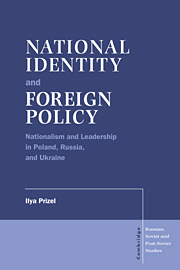Book contents
- Frontmatter
- Contents
- Preface
- Introduction: statement of arguments
- 1 National identity and foreign policy: a dialectical relationship
- 2 Polish identity 1795–1944: from romanticism to positivism to ethnonationalism
- 3 Poland after World War II: native conservatism and the return to Central Europe
- 4 Polish foreign policy in perspective: a new encounter with positivism
- 5 Russia's national identity and the accursed question: a strong state and a weak society
- 6 Russian identity and the Soviet period
- 7 Russia's foreign policy reconsidered
- 8 Ukraine: the ambivalent identity of a submerged nation, 1654–1945
- 9 Ukraine after World War II: birth pangs of a modern identity
- 10 Foreign policy as a means of nation building
- 11 Conclusion: national identity and politics in the age of the “Mass-Man”
- Index
- Cambridge Russian, Soviet and Post-Soviet Studies
Introduction: statement of arguments
Published online by Cambridge University Press: 18 December 2009
- Frontmatter
- Contents
- Preface
- Introduction: statement of arguments
- 1 National identity and foreign policy: a dialectical relationship
- 2 Polish identity 1795–1944: from romanticism to positivism to ethnonationalism
- 3 Poland after World War II: native conservatism and the return to Central Europe
- 4 Polish foreign policy in perspective: a new encounter with positivism
- 5 Russia's national identity and the accursed question: a strong state and a weak society
- 6 Russian identity and the Soviet period
- 7 Russia's foreign policy reconsidered
- 8 Ukraine: the ambivalent identity of a submerged nation, 1654–1945
- 9 Ukraine after World War II: birth pangs of a modern identity
- 10 Foreign policy as a means of nation building
- 11 Conclusion: national identity and politics in the age of the “Mass-Man”
- Index
- Cambridge Russian, Soviet and Post-Soviet Studies
Summary
In analyzing the development of the foreign policy of a given polity, the political science community has tended to view the process as rational and pragmatic. The theory is that these policies reflect geopolitical realities and stem from clearly defined national interests.
While it is certainly true that all states pursue what they perceive as a rational foreign policy, the parameter of what constitutes rational choice is a flexible and elusive concept. In addition to such objective factors as geostrategic position, geography, economic factor endowments, which indeed do impact on the formation of foreign policy, there are broad subjective criteria which guide the political choices made by states. Even within the framework of Western civilization, a civilization ostensibly based on eighteenth-century rationality, arbitrary factors such as moral and cultural values and national identity underlie many aspects of foreign policy. It is my contention that in order to understand the dynamics of foreign policy formation, it is vital to assess how the identity of a polity has evolved, and what new intellectual parameters the polity has internalized.
Given the prevalence of the “rational” model of policy formation, the most irrational concept of nationalism and national identity as a vital element of foreign policy formation is generally shunned by modern scholars. On the rare occasions that nationalism, let alone national identity, has been incorporated into the analysis of a specific foreign policy, it has been viewed as an outburst of irrationality that passed once rationality returned. Such an explanation has been given for the behavior of Germany in the two world wars and for the jingoistic yellow journalism in the United States on the eve of the Spanish-American War.
- Type
- Chapter
- Information
- National Identity and Foreign PolicyNationalism and Leadership in Poland, Russia and Ukraine, pp. 1 - 11Publisher: Cambridge University PressPrint publication year: 1998



